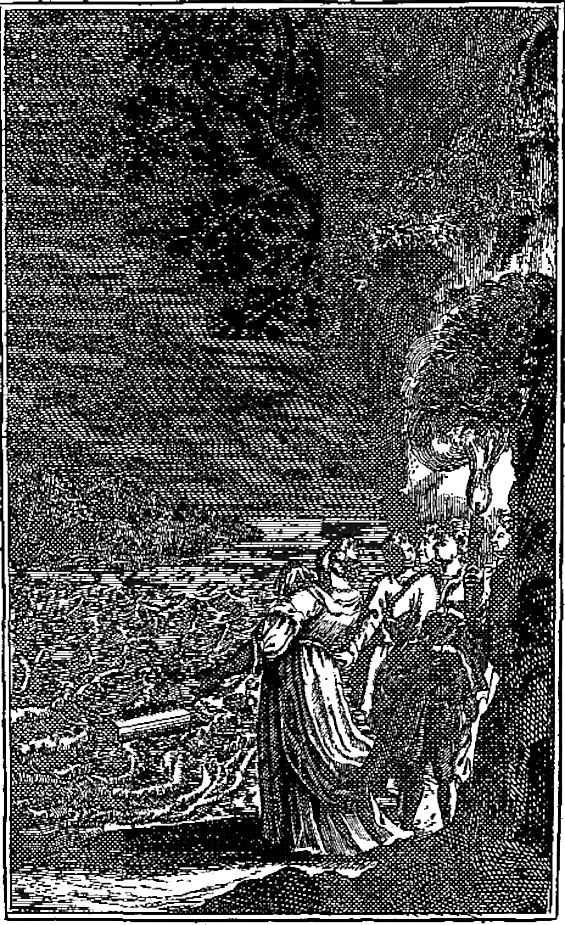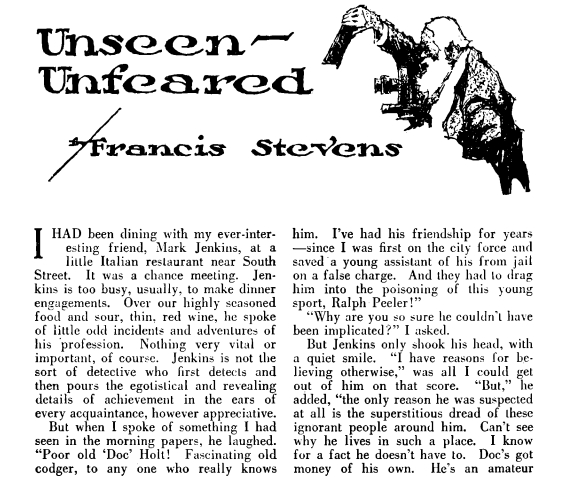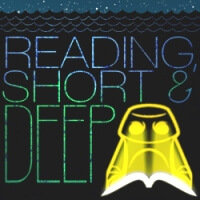The SFFaudio Podcast #781 – The History Of Hayy Ibn Yaqdhan by Ibn Tufail, read by Evan Lampe. This is a complete and unabridged reading of the book (2 hours, 57 minutes) followed by a discussion of it. Participants in the discussion include Jesse, Evan Lampe, and Terence Blake.
Talked about on today’s show:
Terry the loner, a conversion, Terénce is better than Terence, the necessary existent, why are we listening to old dead Europeans?, it’s Tarzan, Stranger In A Strange Land, enriched it with sex, implied sex, conceives the possibility of sex being a distraction, might be converting to Islam, raised Lutheran, if Evan were to convert: Islam or Calvinism, neo-platonic symbolic interpretation of Islam, Avicenna, John Vervaeke, Awakening From The Meaning Crisis, alternative titles, human reason, the History Of Hayy Ibn Yadhan, is this a story of humanity story?, yes, a history of philosophy story, a scientific interpretation of a history of humanity on earth story, there was a pool of very muddy water, it had fermented a lot, it so came to pass, a receptacle, the crappy story of how earth got life, full sized human baby, cute and fun and silly and gets us where we need to be, a bad novel, a fun thing for what it is, forgotten about Roman novels, for dramatic events, more like a Philip K. Dick novel than Edgar Rice Burroughs, raised Christian, the aesthetics, he would definitely have dug it, this book doesn’t wrestle with evil very much, what is good, evil as blindness, on the ethical side, his moral code, through his system, life the universe everything, necessary existent, are your podcast listeners familiar with Avicenna?, ethics are rooted in communities, morals vs. ethics, ethics is for jobs, Deleuze’s definitions based on Spinoza, the application, universal constants, not in a hurry, puppy drowning in the river, get that puppy, dog catcher, commitment or relationship, I can help you cheat at school but I can’t help you cheat at learning, make your prison stay better, good ethics vs. good morals, you shouldn’t lie except…, find a way to be tricky and deceptive, on the same page, new friend, many points in the 115 chapters, this is all impossible, 28 years old, now he’s going to learning language, that burning bush over there, get past that, those things are in Tarzan, a primer (how to read book), he’s also a child, lots of impossible things happen, improbable things, either way the creation myth works, nurses her son, puts him in an ark, God take care of my son, beach, a roe nearby, the baby ain’t changing her own diapers, lick up their shit, how everything works in this, figuring out what the stars are, this is not a fiction story, a fiction way of making your students be introduced to all of these concepts, mostly right, wrong in the details, from the physical to the spiritual, wanting to live in a videogame, deny their body, focus on the mind of god, mortification and starvation, getting closer to that perfect union through understanding god with mirrors, largely concerned with science, the philosophy of religion, let’s form a society, just like the scholastic in Latin Europe, Thomas Aquinas, justify this through Aristotle, Plotinus, a doctor, scholarship, what makes it a golden age, parallels with what is happening, a condensed text, an autodidact, packaged like we think of as a novel, two creation myths, let’s just examine the facts of how the sun works, how heat works, all tricks to get you into the science, natural philosophy is what we would call science, talking about the food, the morality of the food that you put into your body, animals and eggs, vegetables, stand on fruit, fruit is the most interesting kind of food to talk about philosophically, fruitarians, not kill a plant, roots and bark, fresh vegetables, weird cases, fruit or vegetable, pumpkin, strawberries, parafruit, acting like a fruit, doing what the plant wants, how drugs work, obliquely referencing quinine, Jesuit bark, developing our relationship with plants, we had this discussion, eating fake meat, if it tastes like meat, super-interesting, modern Muslim and Jewish orthodox people, philosophically disposed, religious ideas people just accept, if you think it through, a consequentialist, being offended by a dildo, something is fake, dildos do offend people, glossed over, daily ablutions, the philosophy of washing up, plants rubbed into his private areas, he took them where they were abundant, more from the roe’s point of view, god killed her fawn, there’s no predators on this island, this ecosystem is fucked, two and a half hours, do your own Hayy Ibn Yadhan fan fiction, he spent a year thinking about his relationship to scented plants, why it is good to keep your bum clean, the Robinson Crusoe connection, eating of that guy’s food, not a food that he should eat (because it is too good), generally right, vaping scented vapes, a chemical that helps them regulate their mind and mood, drugs to excess, to escape the pain of capitalism or whatever, don’t enjoy things too much, sleep cycle, sleep hygiene, having this character learn about reality, the ecosystem, this other, philosophy of religion, all up their own asses, not on observation of the universe, inner knowledge, rationalist and empiricist, why is she not moving, she will move again, he loves his mom, after a certain point you can’t fix the plumbing, a traumatic theme, more of a medical explanation for why people die, going into the soul, better explained using brain chemicals, all reductionist, fastidious about what he eats, pleasure therefore not really necessary, drunk on the spinning, the Sufi stage, exercise, that’s still the body, you have to go in circles like the heavenly bodies, still material or sensory or corporeal, runs around his house, runs around the island, not far enough, whirling dervishing, little kids do it naturally, special dresses that fly up, his solution is go in the cave, get in the tantric pose, starve yourself, hare shirt, whip yourself, high on your own supply, mushrooms, peyote, Joe Rogan talking to aliens, the gateway to the aliens, just replace God with aliens, looking for meaning, satisfied with the educational steps, high enough state, we won’t have to worry about meaning anymore as we will be in communion with god, look at that lumpy rug, a history of mistakes, bring it together, better understanding, meaning has to be derived from experience on the earth, this is how we’ve been doing it, how early and how right, lot a Greek stuff in here, Peter Adamson on The History Of Philosophy Without Any Gaps, it’s never gonna end, other traditions, China next, third most translated from Arabic, the Koran, The Arabian Nights, it has a bit of a story to it, fish out of water books, utopias, which is why we like science fiction, what are the rules, Stranger In A Strange Land, subject to Heinlein’s philosophy, The Outsider by H.P. Lovecraft, surrounded by books, assumes he is like the characters in the books, candles, he can’t go into the forest, out of Plato’s cave, spiders and bats and silent rats, a familiar path, to heaven, did some horrible thing come into the house behind me, male or female, a memory of a better place, visions of heaven and being close to god, built into humans, a better place available to us, where the power of saying there is a God out there, how we’re different from the other animals because we have this faculty, a spirit that they don’t have, important unto themselves but not like us, why it is a story, scientist and proto-scientists, 1160 AD, thousand year old book, a meta-fiction story, the two origins, both are true, Moses and Adam, the bible has both stories, silly, incompatible but presented, it’s wrong but a good way to get access to an idea that is helpful, a stage of development, the princess puts her baby in an ark, the book is more intelligent than us, a few extracts from the introductions by modern editors, old science, when it seems really impossible it’s supposed to shock you into an allegorical reading, take away the veil, this story with the light, neo-Platonist, the light, divine light, materialist explanation with the clay is not enough, the light comes first to make the human, the end is not full enlightenment, worldly life, the next step, The Ten Ox-Herding Pictures, the enlightened one, the oneness of God, the story of the Buddha, nobody reads the bible as a scientific text, references to the Koran, a book about the history of why we can know things about the real world, engaging with the creator of the world, transcending the world to appreciate the creator of the world, sometimes he’s starving himself to get to enlightenment, don’t eat meat/cows, what the proper things to eat are, non-fable, things that are not fables, a mist in the center, empiricism, I study facts, steam, the soul coming out?, animal spirits, a white mist that explains that why it was alive, part of the heart is clogged, more than one chamber, one is empty one is full, heart attack, blood clotting, the whole point of that, he looks at the body, there are no holes in it, nobody poked a hole in my mom, if there’s something broken inside of her, what surgeons do, go in there and fix it, transcendence to she is a mechanical creature, but still good, not my job to eat all of these things, not completely separate, why does he covers up his genitals?, furrier genitals, they’ve got a tail, he duplicates that, he’s into imitation, he’s smelling good, he’s radiating light, dressed in a sophisticated way, he looks amazing, he’s not fat, only eating what he needs to, part of his movement, bodily objects in the heavens, get out and take a walk, Tai chi is based on circles or spirals, the best movement is spirals within spirals within spirals, doesn’t hurt the joints, low or no impact, he wants to be with God, he’s not allowed to kill himself, he has to be good to his body, he has to be good to the environment for God’s sake, he’s not going to uproot anything, when he sees a plant that’s too dry he gives it water, he’s healing the creation, a flash of Greta Thunberg, gotta save the world, but for what purpose?, minimize the corporeal element, the incorporeal element in him, too… be one with it?, where the author intends to be, the ultimate goal is that unity with God in the city, those two characters introduced at the end, a cave, an island, an introvert and an extrovert, a Sufi mystic approach, a duty to that community, those ethics are established, you’ve finished the book, as a young person, take what you’ve learned into society, in doing so your spreading the religion/knowledge, the way Jesse finds meaning, share it with everybody, most people don’t read, a nice poem in an old magazine, job well done Jesse, the others don’t like it, they’ll never get to it, be good, be nice, and protect your business, the writer is all three, too literal minded, follow your inclination then, be one with God and do what you will, born on an island and stay on an island, going into the cave and meditating until you die, you’ve gotta go into the city, you live in a dumpster, you laugh at the politicians as you eat your onions, that’s Diogenes, hang out with dogs, need to be close to services to dig through dumpster, masturbating in public, modelling himself on Socrates, Diogenes is mystical? tell me more, I’ll go live on Instagram, very backwards, selfish, lame, it might be immoral, he’s the one who could stay in the cave ethically, the problem with the libertarian point of view, Trish’s voice, not that way Trish, not more female voices in this sausage fest, a natural instinct, a goat that suckles a kitten with no mom, lonely, not of its own species, morality and instincts are related, go away or soothe, built in, for females they suckle children, they lick them clean, one day my child will take over my business, as a male we don’t have that instinct as much, categorization, taking things apart, the instinct to be a mechanic is more male, nurture and take care, cut and dried, people disagree are fuckin nuts, if this princess had had a daughter it wouldn’t go into a cave, lady sitting in a cave, meditating all day, early Christian church mothers, once they’re indoctrinated, female brains, blind people brains, different skills, definite dispositions, this book doesn’t go there because it’s just one dude, trying to go there, there are female religious fanatics, flagellate yourself, deny the body, a more male phenomenon, I gotta go, the baby needs to have milk, once your kids are grown, grandkids, supervision, the occasional story, wipe dirt off wipe dirt in, because we live in a gendered society, societies are gendered, we could abolish gender, males and females then, the progeny has to be raised up, done by groups of people, the suckling is only done by the female, more weaving, men weave too, hunting in the forest, once they get out of a certain stage they’re into a city, lenses, glasses, burning glasses, related to the tech you can get from the city, mirrors, do your science stuff, in order to have cities, bringing supplies to the lens-grinders, a guy who doesn’t have a lot of needs, when that guy comes to the island they’re having sex, funny, very high spirtiual status, have sex without even noticing, a baby appears on a puddle on the beach, a sealion comes by and nurses this pup, god is busy strangling it’s pup, married Apollo, Pythia, these are animals pretending they’re not animals, if there was a woman on the island, whatever the Koran said about marriage and family, he gets ultimately to Islam, multiple wives, a controversial position, the Jews not so much, one at a time with the Romans, making connections between tribes, Mohammad’s wives, the favourite wife, alliance style marriages, having lots of children, to build up, nation states and empires, go to Tahiti, if the food is easy and the weather’s nice, recruits for moving rocks, war with a neighboring island over rock resources, when he goes to the city, cities could be sacked, these are things that are not touched upon, nobody can critique my stuff, you need some guy to tell you to take the slide cover off, researching something that doesn’t exist, the car is out a gasoline, basic baby things that we need to learn, that’s not how real science really works, what are you doing?, ohhh!, solves huge problems, an argument for rationalism that I could flick away, trying to learn from experience, the community of science, it tends to go to the cave, learn this stuff on your own, an experience that’s very rare, a high on drugs style experience, non-transferable but felt real, fiction helps you learn things that are real, use a fiction example, you’re dad’s dead, I would feel terrible, j/k, if they can give their own fictional explanation, how you acquire that meaning, not just the engine, read this book then go talk about it with a bunch of other people, it can’t live without us talking about it, it’s missing something, one of Evan’s specialties is the history of the worker movement, a whole history, The Ignorant Schoolmaster by Jacques Rancière, master-pupil model, social power relations, science is collective, any kind of work outside of the most primitive is , underdog educated by the topdog, if I teach something we are now equal, educational establishments, I’ve been teaching him like he’s inferior, in mathematics, G.H. Hardy, strange letters from an Indian [Srinivasa Ramanujan], at this level in mathematics, workers education is social, you don’t have to go through official channels, I get that point, learning from other people, a defect of the book, he thinks in terms of heaviness, what do you think will happen?, heaviness is not the same as gravitation, it must be shorter, a proof on a page, the proof blew Terence’s mind at 11, a part of an infinite set is the same size as the original, math is a real problem, live in a cave with a slide-rule, Cantor’s diagonal proof, other kinds of knowledge, geology is not solvable in a cave in a human lifetime, figuring out the rock cycle, water’s states, impressively frozen on the equator, water gets bigger when it freezes, less dense in its frozen state, the Greeks, doing all inferences, takes that step into being the caretaker of the island and the animals on it, what the , he says to the deer he can make sounds of but can’t answer them back, this is not how it works, Rene Descartes, I have an idea of god in my mind, gymnastics, people can be wrong, people can be confronted, internal experiences, going in the wrong direction, reform a city, Plato to step in, that’s probably wrong Mr. Plato, retreat to the cave, get closer to God, Aristotle’s physics, look at how happy he is, why would the laughter cease?, would never have been able to write the book, language came letter, writing in parables then in metafiction, why Ibn Tufail has gone a step further, a book that encourages more books, heirachy in educations, becomes a guru, he’s the master, he has his followers, that’s bad, that’s the wrong attitude, inherently hierarchical, being older makes you more wise (not always), [Mikhail] Bakunin’s dentist, two people on a beach, the older one, giving my game away, knows how the oars work, pulls up a chain, a little cage, a crab or a lobster, Jesse’s not a lobsterman, eventually that shorter one will know how to do this job, where to put these traps, one of them is a young person, transfers the knowledge on, outside of school systems, flint tip arrows, one can’t do the lobster trapping anymore, more like a chain of responsibilities, explaining stuff, learn a lot, students aren’t always great teachers, if circumstances are such, so wonderful, learning so much, given the system we’re in, servers to pay for, a really nice book, they’ll learn even more in discussion, hear somebody talk about a book, talk with somebody else, how the genuine learning is genuinely happening, documentary, a room with a bunch of nurses wearing masks, swaddling babies, a table with forty or fifty babies, those babies have no names, piles of baby, raising children, this is my baby I love it, when your breast milk is working again, widgets, you’re in this class and I will mark you, they tell you about a book they read, I’m too old for that genre of book, that’s fun, the social aspect as well, recommend not just one book, not just ten, explanation, discussions, Evan’s blog on Philip K. Dick, built on a foundation got from society, a tabula rasa from birth, he’s not sharing, throw in other people, society makes something out of that, already enmeshed in social relations, factually wrong, allegorically interesting, podcast or write a blog, intellectual evolution, born on an island, possibly a puddle on a beach, get away from the ego, learn on their own, Evan’s blog is: philipkdickreview.wordpress.com, what book is his best, juvenalia, buddy, posthumous, Olaf Stapledon, also science fiction that is not a novel, Sirius, a novel, the banner is a big slum, Mars, kipple, everywhere humans go, trashy and garbage, super-socially active in his community, trashing the school board, make political change, writing congratulations to Richard Nixon, what an autodidact there, that’s when he gets nutty, stops engaging in society, big mistake you’re not meant to make, at the height of illumination you think you are God, something about avoiding the mistake, fell into the mistake however you define it, even along the way, the occasional place he would revert back, do something fun with it, we don’t need to be bipolar, the crazy ones, he believes everything, just great ideas, born on drugs, sparking all over the place all the time, his reputation, the drugs are to stay up late and write a novel, LSD, his fleshy hariry sweaty world around him, he wrote a lot about drugs, Heinlein’s sex-life, a guru for some aspect of the sexual revolution, weird cult, The Church Of All Worlds, Oberon Zell-Ravenheart, annoyed, Ayn Rand, The Harrad Experiment by Robert Rimmer, nothing can possibly go wrong, sexual anxiety is learned, educate he current generation, a wonderful book about this, Make Love, Not War: The Sexual Revolution: An Unfettered History by David Allyn, Thermidor, vs. humidor, a month, effecting the social movements, drugs are cool, weird shit happens, chew that Chew-Z, druggie reputation, Heinlein is more deserving of his reputation, a pretty sex-free book, we need that sequel, Jesse and Connor, an immoral book, the guy’s a fuckin asshole, you’re my slave now, a Pierce Brosnan adaptation, they have to do things to make the characters not monstrous, Friday judo flips him, you look like me, I don’t understand words, food, cultivate this relationship, friendship is sealed, a non-hierarchical relationship, I’m doing a mini-colonialism and you can to, thank god for all your providence from god, then you get slaves to increase your yields, a go out and do this kid book, there’s a cave in the book, a general mistake, a way of retreating from horror in the world, born into a world of pain, so I can get closer to God, the stories are often quite attractive, if you’re really hardcore about this you’ll go live in a monastery, thank you for recording it, good discussion, Mating Center please, Frank Belknap Long, some other sex books, more Orrie Hitt, Orrie Hitt country, audiobooks, the beautiful and the frustrated fought to go to the…, eugenics society, social role, a frightening view of life and forbidden love, breeders, set aside to breed, horn people that can’t breed wanna fuck, a new rubric, Water Is For Washing, the original scan, one of his shortest stories ever, slavery for a while, Harriet Beecher Stowe, three of her books, Uncle Tom’s Cabin, two volumes, serialized in a newspaper, her whole reputation today lies on this one book, until next week, Terence is a pirate too, LibGen, studying up for the next podcast, writing, three episodes, the essays, say something nice about it, youtubing on the philosophy of mathematics, the poetical philosophical history of mathematics, Logicomix: An Epic Search for Truth, symbolic logic, Bertrand Russell, some Greek guys, a comic about Oppenheimer, 3 hours is a lot, Terence sat through Oppenheimer (2023), the history of blowing people up?, something really baby about it, just look at the trailer and read the script, Dunkirk (2017) or Tenent (2020), no sound problems, people used to being coddled, Bane character, some special sounds, clear and distinct, a clear and distinct voice of god, a Goddard movie, attached to the dialogue, a secret advantage, follow better, subtitles allow you to read movies, just the words that are being said by a person, turning somebody’s podcast into text, simultaneously, double participation, you can see the artistry or inartistry, preparation, it’s a spoiler is what you’re saying, spoilers is the search light in the bucket theory, Popper’s famous essay, Karl Popper, I love deep buckets, Christopher Nolan, movie makers reputations as directors anymore, one of the last operating, Momento (2000), small scale, you could talk about the ending, the premise is awesome, the conclusion or beginning naturally follows, Insomnia, The Prestige, based on Christopher Priest’s novel, The Dark Knight (2008), Inception, it doesn’t have a fatal flaw like The Matrix (1999), sequels, one special cut of the sequels, cut out all the zion scenes, Interstellar (2014), idea wise it is slow, Contact (1997), pretty normal except for the last part with the voyager, the both have Matthew McConaughey, the religious nut, is it meaty?, movies aren’t as generally deep as good books, very well done for the gimmick that it is, look and see if there’s something I should download, more utube, Red Letter Media, Best Of The Worst, one of the characters from the Star Trek cartoon, he plays Hughie on The Boys, he’s in Oppenheimer (2023) as well, whatever those guys are, slipping him a script to give to Nolan, teach me to read, Jesse’s level of jokes, a nice little joke here and there, that format has never existed before, a kind of media that has never existed in any other format, One Minute Critic, a review of it in 60 seconds, over the course of 40 minutes or an hour and half, wonderful, right, when they invented plays, own TV channel, talk about whatever I wanted to, but now it’s real, the format and the server space, plop into the hands for virtually zero cost, when podcast started, you don’t need video, a slow motion big wrong stamp, to enhance the joke, Russell Brand, a little more flexible in the definition now, it’s something else, a very weird podcast, plan for a career in watching old VHS tapes, a career in reading old books, that they do this as a job is incredible, are you serious right now?, a big enough casual enough less time intensive, turned off books, longer blogposts into several chapters of a book, if you’re not in the system, if you don’t play the game, he’s terrible at marketing, a university professor contacted Terence about a blogpost about François Laruelle, in fact you will be paid nothing, things that need to be changed, can you do some more work for my book?, as if Terence was an idiot, normal procedure, academics write books and publish for free their articles so they can put it on their CV, you don’t need to sell these books, don’t bug me, I won’t re-write, I’m busy, online magazines, even if they’re not getting paid, makework projects, pre-existing contact or relation, to make them happy, keep money out of the system, lousy translation, improve it for them for free, they just forget Terence afterwards, busy trying to find their own meaning, when the web is inaccessible, you might stumble over an old book in a bin, whatever the version of scanning is in the future, a list of stories, a reprint of a 1959 short lived magazine, two Silverbergs under pseudonyms, two, Laurence Janifer, Demons Of Cthulhu, $23 shipping, I don’t need money just don’t get new things, occasionally replace a tire, be born rich, putting stuff online, find people who have a copy of that, what Terence just did for Evan there, that’s the great thing about working in a community, a little piece of advice, drag and drop and it’s done, get out of your fucking cave, three books just received, The Weird Tales Boys by Stephen Jones, relations between Lovecraft, Howard, and Smith, Robert Silverberg’s Monster And Things, The Thing Behind Hell’s Door, these are public domain, don’t ask is my policy, published in May 2023, the shipping, peripheral material, Asimov’s introductions, Worlds Of Wonder by Robert Silverberg, Science Fiction 101, Sheckley and Bester, you got it exactly, thank you so much, explaining a book, reading a book is more work, pay close attention to grok it properly, it’s the bucket and the searchlight again, an interesting light, college instructor, flying off to Germany, The New York Review of Books, a Stanislaw Lem collection, prefaces to unwritten books, Sartor Resartus, “Imagine dedicating much time and effort to a parody! (And a quick perusal indicates it’s quite well done, not a slipshod (albeit very droll) Devil’s Dictionary.)” a book about books, LibriVox, it will come, one on yotube as well, AI is fuckin horrible, it’s an AI, getting really good, they don’t know how to read sentences, even a flawed human, garbage truck makes a noise, a real guy reading a real book makes a huge difference, a readalong, sometimes they coincided for fragments of sentences, an extra dimension, quite good, 1.3 speed, it became a short story, incredibly dense, 900 years ago, when it’s that far back, whole decades and systems and fashions have gone by, Avicenna was contemporaneous?, when the king was sick, a trap, 1037, 1105, they were overlapping, court physician, the king died, his creed avicennaism, creed instead of religion, a formalized set of belief, you say these words Terry, ok, then you do it, your ethical responsibility, you took on this creed, the Nicene Creed, this guy who was mad at Jesse in Australia, Sci-Phi, evangelical christian, worldview, a cynic?, sounds bad, fairly skeptical, the Iraq War, dropping bombs on people, just war theory, this is not just, what about WWII, on forums, critiquing his podcasts, Battlestar Galactica, trying to be evangelical online, the movie version, it just doesn’t have the depth, Next (2007), The Golden Man, three levels in a story, Blade Runner (1982) is quite deep, they’re children, the movie goes pretty deep because it doesn’t have a definitive, a very watchable 2001: A Space Odyssey (1968), fall asleep, we see the unicorn being placed, the world falling apart around them, they reinforce each other, the Denis Villeneuve one, the horrible setup for a sequel, three or four sequels, garbage, boiling his food, heavy kipple, the hitman showing up, the kids working in the garbage factor, the opening scene is quite solid, the robot and his robot girlfriend with no body, when he though maybe he was the one, stupid in itself, filled my barf bag, imperfect and flawed, the bad parts about The Matrix (1999), there is no spoon, fuck off with your spoon, we need to recruit you because it’s the right thing to do, space Jesus, a purpose for action, Come And See (1985), Belorusan boys, a mascot, witnesses horror, a line from the bible, Revelation 6:1-17, all shall be revealed to you, The Poor Miller’s Boy And The Cat, Bros. Grimm, Old Woman In The Wood, a good one, a good episode too, The Cat’s Advice by Jesse, for those still listening, seething, the cat is touching the knee, Puss In Boots, the curious feline, there are many options for a young strong thing, the moral at the end, problematic, what used to be called twitter, too involved, the entity that was formerly called Prince, it was temporary, you need to be active, don’t just react, be ready, worthy of a repost, what a stupid change, dangerous like slot machines, Hippocampus Press, a Clark Ashton Smith novel, a symbolic thing, put some money into a podcast you like, being a patron, a very small server, only for the Canadian stuff, these known billionaires, they hide it, he’s the dumbest of the rich people, he’s the trolliest, Peter Thiel, the lawsuit that broke Gawker, Hulk Hogan against Gawker, a sex tape or something, they’re gonna find out through this proxy, the rest of the billionaires, Bill Gates, MSNBC, positive press, very responsible for the COVID thing, Windows is getting so bad, on Ubuntu all the time, a very robust ecosystem for freeware on Windows, games were bad for Mac, same with phones, Apple is very locked down and pure evil, you can’t stop it, Android is locked down, Linux phones, a Linux basement in it, if you wanna fuck the system, Neuromancer, a very good book, Case, in order to do his hacking, know who the big enemy is and be very similar with their systems, you have to flow down the river, the river is taking everything, maybe capitalism is inevitable, it’s what I’m drowning in, a terrible extended metaphor, needs work, Anti-Oedipus by Félix Guattari and Gilles Deleuze, make their obsessions sound interesting, a river composed of rivers, taking us horrible places, some countries are on the same train or river, not in the same position on the river, the federal government of Canada is completely corrupted, deputy Prime Minister of Canada is the grandchild of a Ukranian Nazi, this country has been invaded, a standing ovation to a WWII veteran, fought bravely against the Russians, he was in the SS, fight the communists for the Nazis, magic wand waved, they surrendered, Ukranian Nazi moved to Canada, seen holding a Bandera flag, SS monuments in Canada, guys we might be making mistakes here, I can’t believe what a monster I was, a willful blindness, the corruption is such that…, the provincial government is much better (but not perfect everywhere), homeless everywhere, neoliberalism hasn’t fully taken over, except for North Korea, China, Burma, Venezuela, Cuba, let’s privatize everything and give everything to the billionaires, the Macron government, gonna survive?, nothing bad is happening to them, the arguments are wrong, sorry we’re just doing it, King Charles has come over, nobody much has protested, mass with the Pope in Marseilles, that was not his role, the new education minister, the Abaya is not to be worn, we’re a secular state, a personal trip, me and my buddy the pope, touching the king, against protocol, they’re in the same class, president is not the king of France, banging on the walls of Vatican city, this boat is very leaky, what’s the alternatives, this particular party is a Nazi party because it is threatening the establishment, Macron centrists, the major left wing party, Nazi again, whitewashed, they hardly say it, Réunion island, not a part of France you get to see much, Lahania, Maui, Réunion is more than twice as far, not quite a million people who live there?, how do the people of France think about Réunion?, what the general ideas are, isolated part of the world, Mauritius, islands in the Indian Ocean, Madagascar, never colonized, the remotest parts of the Earth, a comedy action movie, put your feelers out, a sports trainer, girlfriend is a dentist, they couldn’t earn enough, housing is cheap, imports expensive and not a lot of work, did pretty good, worried, prepared for a month, covers a lot but not very deep, university, several paragraphs from each chapter, this feels like that, don’t forget we’re very religious, working things out for himself, everything that is said is taking sides, stoicism, the different currents and schools, each and every thing, siding with Avicenna, combining Aristotle and Plato’s Timaeus, most of it is inarguable, today it’s all finished, it’s important, it gets us to the next thing, interesting discoveries along the way, Breakthroughs In Science by Isaac Asimov, more influence on the sequels, The Farther Adventures of Robinson Crusoe, and the angels, a book of essays, as if the writer was Robinson Crusoe, typical Hebrew scholars, what you care about books we never knew, doing their own stuff, nice to spend some time in that period of time, the golden age, get old books, read em, write your own, what makes a golden age, doing basic science, philosophy, and art, why don’t we do that again, not everybody is participating, the gentleman scholar vs. the university scholar, our income, mostly cover basic needs, freedom to a podcast every weekend or so, where did it all go, four hours.







Posted by Jesse WillisBecome a Patron!


 Reading, Short And Deep #326
Reading, Short And Deep #326
 Reading, Short And Deep #111
Reading, Short And Deep #111



